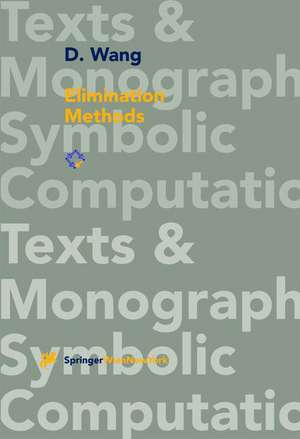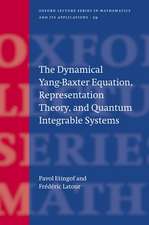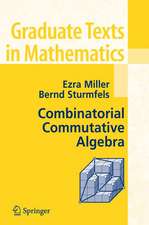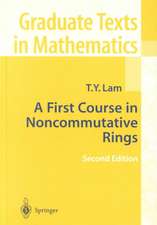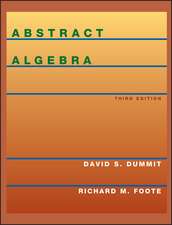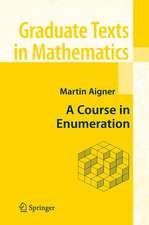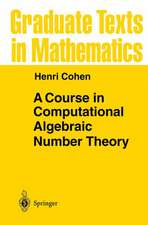Elimination Methods: Texts & Monographs in Symbolic Computation
Autor D. Wangen Limba Engleză Paperback – 30 noi 2000
Din seria Texts & Monographs in Symbolic Computation
-
 Preț: 393.52 lei
Preț: 393.52 lei - 20%
 Preț: 642.33 lei
Preț: 642.33 lei - 20%
 Preț: 335.18 lei
Preț: 335.18 lei - 20%
 Preț: 644.48 lei
Preț: 644.48 lei - 15%
 Preț: 640.06 lei
Preț: 640.06 lei - 20%
 Preț: 929.74 lei
Preț: 929.74 lei - 15%
 Preț: 643.34 lei
Preț: 643.34 lei - 15%
 Preț: 469.55 lei
Preț: 469.55 lei - 20%
 Preț: 591.17 lei
Preț: 591.17 lei - 15%
 Preț: 653.14 lei
Preț: 653.14 lei - 20%
 Preț: 348.89 lei
Preț: 348.89 lei - 20%
 Preț: 343.44 lei
Preț: 343.44 lei - 20%
 Preț: 341.30 lei
Preț: 341.30 lei - 20%
 Preț: 1160.88 lei
Preț: 1160.88 lei - 15%
 Preț: 702.24 lei
Preț: 702.24 lei - 20%
 Preț: 1460.04 lei
Preț: 1460.04 lei - 20%
 Preț: 652.07 lei
Preț: 652.07 lei - 18%
 Preț: 896.84 lei
Preț: 896.84 lei - 18%
 Preț: 1011.45 lei
Preț: 1011.45 lei - 15%
 Preț: 489.36 lei
Preț: 489.36 lei - 20%
 Preț: 1158.76 lei
Preț: 1158.76 lei - 20%
 Preț: 508.94 lei
Preț: 508.94 lei
Preț: 640.71 lei
Preț vechi: 753.77 lei
-15% Nou
Puncte Express: 961
Preț estimativ în valută:
122.62€ • 127.54$ • 101.23£
122.62€ • 127.54$ • 101.23£
Carte tipărită la comandă
Livrare economică 14-28 aprilie
Preluare comenzi: 021 569.72.76
Specificații
ISBN-13: 9783211832417
ISBN-10: 3211832416
Pagini: 264
Ilustrații: XIII, 244 p. 8 illus.
Dimensiuni: 170 x 244 x 14 mm
Greutate: 0.43 kg
Ediția:Softcover reprint of the original 1st ed. 2001
Editura: SPRINGER VIENNA
Colecția Springer
Seria Texts & Monographs in Symbolic Computation
Locul publicării:Vienna, Austria
ISBN-10: 3211832416
Pagini: 264
Ilustrații: XIII, 244 p. 8 illus.
Dimensiuni: 170 x 244 x 14 mm
Greutate: 0.43 kg
Ediția:Softcover reprint of the original 1st ed. 2001
Editura: SPRINGER VIENNA
Colecția Springer
Seria Texts & Monographs in Symbolic Computation
Locul publicării:Vienna, Austria
Public țintă
ResearchCuprins
Polynomial arithmetic and zeros.- 1.1 Polynomials.- 1.2 Greatest common divisor, pseudo-division, and polynomial remainder sequences.- 1.3 Resultants and subresultants.- 1.4 Field extension and factorization.- 1.5 Zeros and ideals.- 1.6 Hilbert’s Nullstellensatz.- Zero decomposition of polynomial systems.- 2.1 Triangular systems.- 2.2 Characteristic-set-based algorithm.- 2.3 Seidenberg’s algorithm refined.- 2.4 Subresultant-based algorithm.- Projection and simple systems.- 3.1 Projection.- 3.2 Zero decomposition with projection.- 3.3 Decomposition into simple systems.- 3.4 Properties of simple systems.- Irreducible zero decomposition.- 4.1 Irreducibility of triangular sets.- 4.2 Decomposition into irreducible triangular systems.- 4.3 Properties of irreducible triangular systems.- 4.4 Irreducible simple systems.- Various elimination algorithms.- 5.1 Regular systems.- 5.2 Canonical triangular sets.- 5.3 Gröbner bases.- 5.4 Resultant elimination.- Computational algebraic geometry and polynomial-ideal theory.- 6.1 Dimension.- 6.2 Decomposition of algebraic varieties.- 6.3 Ideal and radical ideal membership.- 6.4 Primary decomposition of ideals.- Applications.- 7.1 Solving polynomial systems.- 7.2 Automated geometry theorem proving.- 7.3 Automatic derivation of unknown relations.- 7.4 Other geometric applications.- 7.5 Algebraic factorization.- 7.6 Center conditions for certain differential systems.- Bibliographic notes.- References.
Recenzii
"... the algorithms are presented in a ‘crescendo’ sequence, that is, the versions are improved step by step with the introduction of new techniques and concepts, which allows the readers to follow the construction of the ideas; furthermore, this style makes it a very good textbook ... it is a very good text to have on hand for anyone interested in the theories and techniques of elimination methods.” American Mathematical Society"... This book, therefore, is not only topical, but is also the first book that contains all major currently available algorithmic approaches on elimination theory in one conceptional frame ... The book is well suited both as a textbook and as a research reference for the state of the art in algorithmic elimination theory. Theorems and proofs are presented in such a way that the correctness of the algorithms based on them can easily be verified. Well-chosen examples make it easy to understand the concepts and the methods. The main contents of this book - altough not all details - should enter standard curricula on algebra." Association for Computing Machinery
